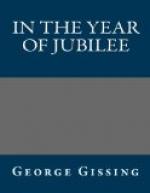At Westminster Bridge all jumped confusedly into the street and ran for the pavement. It was still broad daylight; the sun—a potentate who keeps no Jubilee—dropping westward amid the hues of summer eventide, was unmarked, for all his splendour, by the roaring multitudes.
‘Where are you going to leave us?’ Nancy inquired of her brother.
‘Charing Cross, or somewhere about there.’
‘Keep by me till then.’
Barmby was endeavouring to secure her companionship. He began to cross the bridge at her side, but Nancy turned and bade him attend upon Miss. Morgan, saying that she wished to talk with her brother. In this order they moved towards Parliament Street, where the crowd began to thicken.
‘Now let us decide upon our route,’ exclaimed Barmby, with the air of a popular leader planning a great demonstration. ’Miss. Lord, we will be directed by your wishes. Where would you like to be when the lighting-up begins?’
’I don’t care. What does it matter? Let us go straight on and see whatever comes in our way.’
’That’s the right spirit! Let us give ourselves up to the occasion! We can’t be wrong in making for Trafalgar Square. Advance!’
They followed upon a group of reeling lads and girls, who yelled in chorus the popular song of the day, a sentimental one as it happened—
’Do not forget me, Do not forget me, Think sometimes of me still’—
Nancy was working herself into a nervous, excited state. She felt it impossible to walk on and on under Barmby’s protection, listening to his atrocious commonplaces, his enthusiasms of the Young Men’s Debating Society. The glow of midsummer had entered into her blood; she resolved to taste independence, to mingle with the limitless crowd as one of its units, borne in whatever direction. That song of the streets pleased her, made sympathetic appeal to her; she would have liked to join in it.
Just behind her—it was on the broad pavement at Whitehall—some one spoke her name.
’Miss. Lord! Why, who would have expected to see you here? Shouldn’t have dared to think of such a thing; upon my word, I shouldn’t!’
A man of about thirty, dressed without much care, middle-sized, wiry, ruddy of cheek, and his coarse but strong features vivid with festive energy, held a hand to her. Luckworth Crewe was his name. Nancy had come to know him at the house of Mrs. Peachey, where from time to time she had met various people unrecognised in her own home. His tongue bewrayed him for a native of some northern county; his manner had no polish, but a genuine heartiness which would have atoned for many defects. Horace, who also knew him, offered a friendly greeting; but Samuel Barmby, when the voice caught his ear, regarded this intruder with cold surprise.
‘May I walk on with you?’ Crewe asked, when he saw that Miss. Lord felt no distaste for his company.




